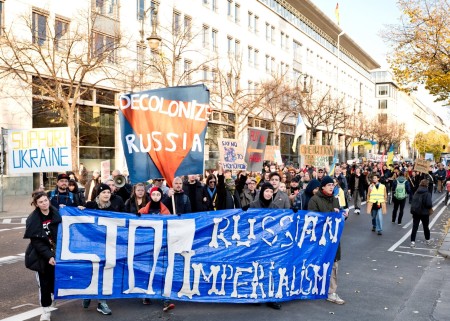 |
| 28-December-2022 |
The full-scale Russian invasion of Ukraine has compelled many people, who live in Russia but are not ethnic Russians [russkye], to think about how we actually became the “small peoples of Russia” [a widely used term for the non-Russian nationalities that make up about one fifth of Russia’s population]. We saw many parallels between the way that the “Russian world” is trying to swallow up independent Ukraine, and the way that the ethnic republics “voluntarily became part of Russia” previously.
 |
| Russians in Berlin demonstrating in support of Ukrainian resistance, 13 November. Photos by Aleksandr Anufriev, from the Feminist Anti-war Resistance facebook page |
We have seen how the state, in which openly-declared nationalists hold leading posts in government bodies, justifies the massacre of citizens of a neighbouring country as “denazification”. We have seen how the propaganda machine is speaking openly about the renaissance of a gigantic centralised empire, in which there is no identity except Russian, and no other language than Russian.
These months have made all of us pose a mass of difficult questions, to ourselves and to each other. And no matter how hard the Russian propaganda machine tries to ridicule or denigrate this process, it will not be stopped and not be turned back – because we have changed. The surge of anger among non-Russian people has gone too far. The genie will not be put back in the bottle.
And the further it goes, the more astonishing it becomes that the majority of prominent Russian liberals and representatives of the “anti-Putin resistance”, continue to ignore what is happening. A great example is the new educational project, “Renaissance” [“Vozrozhdenie”], which opened today [23 December] and which has been loudly advertised on Ekaterina Schulmann’s Youtube channel over the last few months.
For the project, nine men and Ekaterina Schulmann invite people to take courses on the theory of democracy, capitalism and protest, the history of Christianity, and so on. They promise that in future this knowledge will facilitate the working-out of “a strategy for the Russian state, rebuilt and reborn as the inheritor of Russian, European and world culture”. Judging by the visual images chosen – golden-haired young women in Monomakh caps [the crown symbol of the pre-1917 Russian autocracy], gold leaf and portraits of monarchs – the school’s founders are especially inspired by the aesthetics of the Russian empire.
In a video in the section “About Us”, the word “civilisation” appears together with a picture of a young, rouged Ekaterina the Second [usually Catherine the Great in English-language history books] – the empress who first seized Crimea and began the process of genocide against the Crimean Tatars. That same Ekaterina, whose army slaughtered the population of whole towns in the name of the country’s “growth”.
And so in the tenth month of the full-scale Russian attack on Ukraine, we continue to witness how Russian liberals ignore any consideration of decolonisation. They do not even pose questions about the ideas and interests of those who have not been, and do not want to be, “inheritors of Russian culture”. They have not been troubled by doubts about the abstract liberal ideals of “democracy, freedom and peace”; they have no hesitation in proposing “Europe” as the source of progress, as opposed to the east. One of the courses offered by “Renaissance” is titled, in the best traditions of orientalism: “The East: a delicate matter”. …
People who can today link the word “civilisation” with portraits of Ekaterina the Second and festive, gold-trimmed panoramas of Moscow and St Petersburg, and who can promise the “renaissance of Russia”, must be blind and deaf to the suffering, and the hatred, of the Chechen people, who were subjected to genocide by the nearly-democratic Moscow of the 1990s. Blind and deaf to the hatred, and suffering, of the Ukrainian people, subjected to genocide by the authoritarian Moscow of 2022. Blind and deaf to the hatred, and suffering, of everyone whose first language definitely should not have to be Russian. And this lack of feeling is monstrous.
✤ These comments appeared in Doxa’s Anti-war Digest on 23 December. I have translated them, because I think they offer useful starting-points for discussion about “decolonisation” of Russia that has begun not only among anti-war Russians, but also among those elsewhere who take the side of Ukrainian resistance. With Mira Tai, we witness “how Russian liberals ignore any consideration of decolonisation” – and, I would add, some self-proclaimed socialists do the same. One such is the writer and publicist Boris Kagarlitsky, who is to teach courses for “Renaissance”, and appears in its introduction video. He expressed opposition to this year’s invasion, but only after years of support for Russia’s imperial adventure in Ukraine since 2014 (for which he was criticised on this blog and elsewhere). SP.
✤ To read more about Doxa in English, see an interview with Doxa activists just published by the Ukrainian socialist journal Spil’ne (Commons), and these speeches from the dock by Doxa editors Armen Aramyan, Volodya Metelkin, Natasha Tyshkevich. They were tried on criminal charges last year, after publishing a video that discussed whether teachers should discourage students from attending demonstrations to support Alexei Navalny, the anti-corruption campaigner. (Doxa’s new web site is in Russian.)
✤ You can also read in English about anti-war activism in Russia on the Feminist Anti-War Resistance facebook page. The Russian Reader blog is an essential source, as is OpenDemocracy; Posle journal reflects the view of Russian socialist activists.







No comments